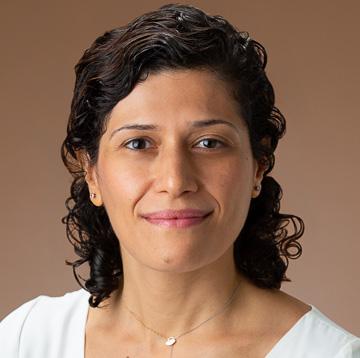
Sarah Hormozi
Biography
Sarah Hormozi recieved her M.Sc. in Mathematics and her Ph.D. in Mechanical Engineering from the University of British Columbia in 2011. She then completed the most prestigious Canadian postdoctoral fellowship award, sponsored by the Natural Sciences and Engineering Research Council of Canada (NSERC), and subsequently joined Ohio University in 2014 as an Assistant Professor of Mechanical Engineering. She was promoted to Associate Professor in 2019. She moved to the department of Chemical Engineering at Cornell University in 2020. She also serves on the advisory boards of Journals of Non-Newtonian Fluid Mechanics, The American Institute of Chemical Engineers and Physics of Fluids.
Research Interests
Sarah Hormozi has a broad research interest in fluid mechanics, rheology, and microstructure of complex slurries; i.e., suspensions of non-Brownian particles in complex fluids. The flows of complex slurries are ubiquitous in many natural phenomena (e.g., landslides, mudslides, and submarine avalanches) and industrial processes (e.g., converting biomass into fuel, chemical mechanical polishing in semiconductors, body armor fabrics, concrete industries, additive manufacturing, flow batteries, drug delivery, blood cells segregations, and biolocomotions). For these applications, even small increases in efficiency when processing complex slurries could make significant positive economic and environmental impacts. Obviously, a thorough understanding of the rheology and fluid mechanics of complex slurries in natural and industrial settings is essential to improving the efficiency of production. However, this research task is extremely challenging due to the nonlinear rheology of the suspending fluids, the interaction of fluid and particle phases, and multiple-body and short-range interactions of particles. Sarah's research contribution spans from large core computations to advanced lab-scale experiments to applied mathematical techniques to understand natural phenomena, resolve industrial problems, and explain the behavior of complex systems from a fundamental physical perspective.
Teaching Interests
Sarah Hormozi has taught undergraduate and graduate level classes in Transport Phenomena, Rheology and Mathematics.
Selected Publications
- Sarabian, M., Firouznia, M., Metzger, B., & Hormozi, S. (2019) Fully developed and transient concentration profiles of particulate suspensions sheared in a cylindrical Couette cell. J. Fluid Mech, 862, 659-671.
- Liu, Y., Balmforth, N.J., & Hormozi, S. (2019) Viscoplastic surges down an incline. J. Non-Newtonian Fluid Mech, 268, 1-11.
- Madraki, Y., Ovarlex, G., & Hormozi, S. (2018) Shear thickening in non-Brownian suspensions: An excluded volume effect. Phys. Rev. Letter, 121, 108001.
- Gholami, M., Lenoir, N., Hautemayou, D., Ovarlez, G., & Hormozi, S. (2018) Time resolved 2D concentration maps in flowing suspensions using X-ray. Journal of Rheology, 62:4, 955-974.
- Firouznia, M., Metzger, M., Ovarlez, G., & Hormozi, S. (2018) The interaction of two spherical particles in the simple-shear flows of yield stress fluids. J. Non-Newtonian Fluid Mech, 255, 19-38.
- Alghalibi, D., Lashgari, I., Brandt, L., and Hormozi, S. (2018) Interface-resolved simulations of particle suspensions in shear thinning and shear thickening carrier fluids. J. Fluid Mech, 852, 329-257.
- Hormozi, S., & Frigard, I.A. (2017) Dispersion of solids in fracturing flows of yield stress fluids. J. Fluid Mech, 830, 93-137.
- Balmforth, N.J., Craster, R.V., Hewitt, D.R., Hormozi, S., & Maleki, A. (2017) Viscoplastic boundary layers, J. Fluid Mech, 813, 929-954.
- Madraki, Y., Hormozi, S., Ovarlez, G., Guazzelli, E., & Pouliqen, O. (2017) Enhancing Shear Thickening, Phys. Rev. Fluids, 2, 033301.
Selected Awards and Honors
- 2018 OHIO Baker Fund Awards
- 2017 OHIO Faculty New Makers
- 2016 NSF CAREER Award
- 2016 The Marvin E. and Ann D. White Research Award, Ohio University
- 2016 Women's Mentoring Program Service Award, Ohio University
- 2015 American Chemical Society Petroleum Research Fund, DNI Award
- 2013 NSERC Postdoctoral Fellowship

